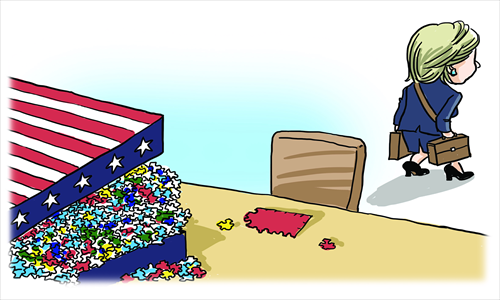Clinton's strategic choices put successor in tough position

US Secretary of State Hillary Clinton will leave office later this month, with Senator John Kerry expected to succeed her. Some Chinese view Clinton as an outstanding political figure. However, public aversion to her in China in recent years has been rising.
One decade of the war on terror and the financial crisis since 2008 caught the US in two fires, while the rise of emerging powers represented by China and India had a severe impact on the international order dominated by the US.
The world strategic and economic focuses are shifting to the Asia-Pacific region, with countries in other regions such as Russia and Australia all attempting to hop onto the Asia-Pacific juggernaut. Against this backdrop, the US strategic shift is understandable and its fundamental purpose is to maintain its global leadership.
Clinton's biggest contribution is that she has promoted the US strategic shift and rebalancing strategy in the Asia-Pacific region. She broke with tradition by making her first official overseas trip to the Asia-Pacific.
Clinton wrote in Foreign Policy magazine in November 2011, "One of the most important tasks of American statecraft over the next decade will therefore be to lock in a substantially increased investment - diplomatic, economic, strategic, and otherwise - in the Asia-Pacific region." She believed "the region is eager for our leadership."
To realize these goals, Clinton has not only inherited the US diplomatic means of the past, but also promoted the use of smart power, picking the right combination of diplomatic, economic, military, political, legal and cultural tools at her disposal.
The Clinton-designed US return to the Asia-Pacific proceeds from the perspectives of politics, military, economy and trade as well as ideology and values. Under the framework, the US constantly strengthens its military deployment in the Asia-Pacific, inciting disputes between China and its surrounding countries.
However, the rebalancing strategy in the Asia-Pacific didn't bring regional stability, and smart power diplomacy was criticized for sowing discord among countries. Confined by the US economic slump, returning to the Asia-Pacific is almost equivalent to strengthening military alliances.
Clinton expressed a hawkish attitude toward China during the ASEAN Region Forum in 2010, which intensified disputes over the South China Sea and the Diaoyu Islands and interrupted regional integration. The US didn't expect a direct confrontation with China but attempted to make use of its surrounding countries to check the country's rapid development.
The US strategy of Trans-Pacific Partnership (TPP) has also threatened ASEAN's ambition to lead East Asian economic integration.
Indonesia came up with a proposal to establish a Regional Cooperative Economic Partnership to counter the influence of TPP, and relevant countries including ASEAN countries, China, Japan, South Korea, Australia, New Zealand and India reached a consensus on negotiations in November 2012.
The rebalancing strategy in the Asia-Pacific is a result of the shift of world economic and political focuses as well as the US reflection and amendment on its anti-terror war. But it is being carried out in the wrong way.
For US elites of Clinton's generation, belief in US global leadership is deep-rooted. The US is always on the side of natural right and the dominant power of international order.
However, they seem to forget that China is different from the Soviet Union. China's present-day achievements are a result of active adaptation to the existing international order. The US should not contain China's development.
Many problems of the 21st century need cooperation from countries. The US should understand that the economic and trade network of East Asia is centered on China, and market forces decide that anyone who wants to make profit must cooperate with China. Moreover, China's rise is dependent on its domestic drive and cannot be stopped by any external force.
Clinton's diplomacy is fundamentally guided by competition and containment. This is the core reason why the rebalancing strategy destabilizes the region and causes imbalance.
Clinton is going to leave office, but the rebalancing strategy will continue. She leaves an unfinished task for her successor, who should reflect on and learn from Clinton's successes and failures.
The author is a research fellow of the Center for South Asia Studies at the Shanghai Institutes for International Studies. opinion@globaltimes.com.cn
Related article: Secretary of state leaves legacy of instability in Asia-Pacific